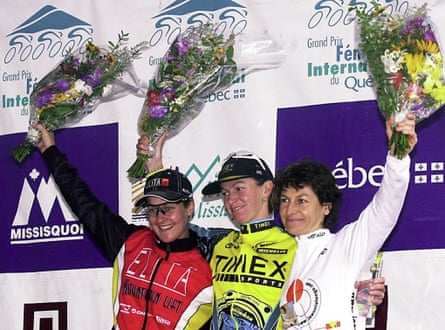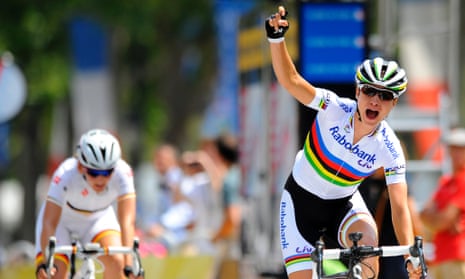Tracey Gaudry has been there and done it all. She is a multiple national champion who has ranked third in the world, won World Cups, the Tour de Snowy and the Trophée d’Or Feminin, where her name is written in the palmares alongside Emma Johansson, Marianne Vos and Elisa Longo Borghini. She is a successful businesswoman, the CEO of the Amy Gillett Foundation, head of the Oceania Cycling Confederation (OCC) and vice president of the Union Cycliste Internationale (UCI), the international body that governs cycling.
“I have experienced a great ride in cycling over 20 years,” she says. From the high of being ranked top three in the world to the low of crashing in a road race at the Olympics, Gaudry saw life as a top professional from the inside before moving into cycling advocacy with the Amy Gillett Foundation and becoming the first ever female president of the OCC in 2012. “I am fortunate to bring a wide range of professional skills as well as cycling experience into the space,” she says of her election. Then another first: Gaudry was elected as one of Brian Cookson’s three vice presidents in September 2013.
She is part of a group of women – alongside the likes of Kristy Scrymgeour who sits on the UCI’s professional cycling council, Wiggle-Honda team owner Rochelle Gilmore and Le Tour Entier co-founder Emma Pooley – who are finally dragging women’s cycling into the 21st century. At the time of her election, Gaudry said: “I’ll be standing alongside, as a lieutenant, to a president who I know is collaborative, who I know is not afraid to seek advice on difficult questions and on simple questions. He has accepted feedback openly and I welcome that philosophy.”

When I spoke to Cookson, he was keen to point out that he is a “listening president”. Does Gaudry still stand by her statement, one year on? “Those are statements I made then and will make them again today,” she says. Her roles in the OCC and UCI put her “inside the tent, working as part of a team to change the game, which was needed, to progress good initiatives that were already in place.” She prefers being able to work from the inside as opposed to agitating from the outside and credits Cookson with demonstrating his strengths as a president who “listens and digests, much more than he speaks”. She feels her role is to provide guidance to help him “form the right views and make the right decisions so that, when you do speak, you’re ready, you’re armed, you’re knowledgeable and you have a trusted team alongside you”.
So are women’s voices finally being heard at the UCI? Gaudry thinks they are but concedes that there is a long way to go. As she points out, her presence at the heart of the UCI is challenging “114 years of history when there has not been a female voice – that’s a lot of history to start and think about how we might adapt the culture, adapt the conversation, bring a new perspective into an existing conversation.” She is equally clear that lobbying for action on the women’s sport should not come from women alone. “It’s about bringing everyone along for the journey, and for me it’s about lining up alongside my management committee colleagues and encouraging a conversation across the UCI and looking at elevating women in positions of significance and influence.” The really great news, Gaudry says, is that this approach is beginning to bear fruit: “It’s not only the women on the commissions putting forward proposals and opportunities to develop women in cycling, it’s the blokes as well.”
Gaudry points out that all of the UCI commissions have people of great experience, expertise and knowledge: “And guess what? More of those people are women these days.” She says women have “a lot to offer, not just the women’s side of cycling but cycling as a sport, to grow it as a way of life and a great activity for everybody.” She points out that the UCI is at the head of a worldwide system of 179 national federations that represent thousands of clubs, across five continents. “There are many ways to foster the involvement of women and to promote the role of women and to achieve great outcomes all the way up and down the spectrum of cycling.”
What about the Women’s Commission, the much vaunted body set up by Cookson after his election? Gaudry says it does not “decide everything that happens for women in cycling”. Instead, the commission takes proposals from other parts of the UCI and works “to understand what they’re striving to achieve, to bring that together and build an argument and a proposal for some of the more significant changes and investments we’d like to make in women’s cycling.”
I wonder whether one of those “significant changes” is the much-debated minimum wage for professional women cyclists. With Cookson admitting he has failed in his manifesto pledge to deliver the minimum wage, and still clearly entertaining doubts about levels of remuneration for women riders, what is Gaudry’s opinion on this thorny issues? Does she agree with the common opinion that a minimum wage will simply see teams collapse or re-register as amateur teams? Is the minimum wage even the most important issue the women’s sport needs to tackle? Gaudry says the whole environment of cycling needs to change and, while some teams are making great steps to achieve that change, there are still “some conditions that haven’t improved a hell of a lot since I retired, so there’s an absolute personal commitment to moving forward.”
For Gaudry, the picture is very much bigger than a minimum wage – it’s about making the environment more supportive for women cyclists. It’s up to the UCI to ensure that events are delivered and promoted well “so the stage women are racing on is set for them to perform at their very best”. Gaudry talks about “professionalising the duty of care” to women riders – ensuring that races are safe as well as spectacular – and looking closely at the team environment “so women are not only protected but challenged, so they can be tested to the extent of their capability.”
Gaudry is pushing to raise standards and conditions: “Remuneration is one element, but it also includes housing and transport.” She uses the example of non-European athletes who cannot just go home on a weekend or between races. She wants teams to ensure that their medical and coaching facilities are sound, that equipment is properly maintained and that athletes have robust contracts with their teams.
The expectation seems to be that weaker teams will fold if equal pay structures are created, but doesn’t that run the risk of sacrificing the opportunities of women who are involved in the sport now for their potential opportunities in the future? Gaudry says this view is “exactly right” and that the UCI want to “raise the bar in a way that is substantial and real, not undercooked and token.” She says that talks have been underway for some time with teams to determine just what that bar looks like “so we don’t set the bar so high that the system breaks – because, if you set it so high that all the teams folded, you wouldn’t have an environment or system.” To ensure that the top women’s teams appear in the top races, the UCI are working with team managers, owners and event organisers “to develop a model so that, when we do put it into the marketplace it has been socialised and tested with the teams, so everyone knows what’s coming and can prepare for that.”
That model will take the form of a two-tier system. Work on its implementation has been ongoing this year. “The serious work started in July when the Women’s Commission met in the afterglow of La Course,” Gaudry says, referencing the historic one-day race that saw women compete on one of the most iconic stages in cycling, the Champs-Élysées. The two-tier model will be implemented over the next two to three years, developing a series of top-tier and second-tier events, all at UCI level, including one-day events and stage races.
As well as her roles with the UCI and the OCC, Gaudry is also the CEO of the Amy Gillett Foundation, which was set up by Gillett’s husband after her untimely death in 2005. Gillett and five of her Australian team-mates were on a training ride in Germany when tragedy struck – a young driver piled headlong into the group of cyclists. Five were injured, Gillett was killed. Her death sent shockwaves through Australia and the foundation, born from the tragedy, advocates for safe cycling in Australia. With a stated intention to be “a catalyst for change, focused on what should be, rather than what is,” they’re a good fit for Gaudry.
Her tone brightens when she talks about her work with the foundation. “It is a relatively small organisation, which enables us to be agile and nimble. It’s really important to be principled, to be robust in your mission and what you’re striving to achieve, to have strong governance so that structures underpinning your work are sound.” She says that both the foundation and the UCI “are well and truly focused on their community and the stakeholders who are important to achieving their respective missions and visions,” but she highlights an important, and telling, difference between the organisations: “The foundation advocate for a lot of change, so if you think about that from the UCI’s perspective it’s a little bit like the Le Tour Entier group, who are advocating change and calling out to the UCI to take up the task and the challenge and deliver that change.” As a member of the UCI management committee, she says it’s good to know what it’s like being on the “other side of the fence – I respect advocacy and I respect the power and good intent, when it’s well directed, of organisations and groups advocating for better outcomes.”
The UCI faced criticism recently for their failure to file paperwork that would have guaranteed paracycling’s participation in the Rio Paralympics. Gaudry is open about the UCI’s failure to submit the application on time, saying there were “unfortunate reasons” behind it. She accepts that the UCI “didn’t deliver to the standard we expect of ourselves” but says the situation “is not a demonstration of a lack of commitment – we’re working very hard to ensure cycling plays a big part in the Paralympic Games.”
If paracycling seems to be taking the outsider role in the “great cycling family” that women’s cycling once assumed, there’s no denying it has been a great year for the women’s sport – and not just on the road. Gaudry is keen to celebrate that success. “Let’s reflect on the fact that women’s cycling didn’t start this year,” she points out “it has been growing in various forms for four decades now.” She points to the abolition of the maximum age and the fact that all the women’s World Cup races were televised “and this year there was a different winner in every single race just showing the depth of talent in the women’s field”.
The World Cup also introduced new categories to showcase different styles of racing and different stories from the women’s peloton. Then came the Women’s Tour in Britain and La Course. Finally she highlights the fact that “significant” investment from the UCI ensured that all the broadcast events actually happened. She says the trick is to celebrate what the sport has achieved, then ensure that next year “we raise the profile of more events on the women’s road calendar”.
That calendar, Gaudry says, was approved at the end of September and the 2015 World Cup series will consist of some “amazing” existing and new one-day races, as well as stage races that are growing in profile. The UCI is also working to ensure that all major women’s UCI road events receive significant TV broadcasting. The work with key stakeholders is already underway and there is, she says, “a sense of urgency inside the UCI because of how important that is for the sport, for women’s cycling and for the movement of cycling worldwide.”
But just how robust is the current state of women’s cycling, bearing in mind that a big team like Lululemon is struggling, that Specialized are pulling back on their investment in the sport, that some teams have not been paying wages, and that Anna Solovey, who won the silver medal in the world championship time trial, has just returned from a doping ban? “Gee, that sounds like the men’s team environment,” she says. “They sound like problems you might see at pro-continental level or continental level on the men’s circuit.” She says these are challenges the sport has to face “across the board – let’s not try and badge every problem because it’s in the women’s environment – we’re working to improve the standard all around.”
We shift the focus again to Gaudry’s homeland to talk about her former team-mate Cadel Evans. The recently retired rider has announced the Great Ocean Road Race – the men’s event has been awarded a 1.1 ranking by the UCI. The elite women’s event is not recognised by the UCI. Gaudry says the UCI did not receive an application for a women’s race but that the organisers are determined that, when such an application is made, the event will be delivered to the same quality and standard as the men’s event. She says the organisers were determined to deliver an excellent event and to “ensure that they could do an event well in year-one and that the right foundation and investment is there to consider a UCI double header in the future.”
Our time is nearly up and I ask Gaudry one final question: what does the future of women’s cycling look like and when will we see it delivered? Gaudry talks first about the future for women’s road cycling, pointing out the work being done across all the cycling disciplines, including coaching and development programmes worldwide. The timing, Gaudry says, looks like this: in December there is a women’s World Cup seminar, which will take place in Switzerland and bring together World Cup race organisers with organisers of other major races “to plan to maximise the profile of all the major women’s events throughout 2015, to build on the great work that was done this year.”
The seminar will examine the concept for a professional women’s road series and develop its structure, possibly in two tiers, to be ratified in terms of rules, regulations and protocols during 2015, for implementation in 2016. Beyond that, Gaudry says, “We’re also continuing the conversations we’re already having with women’s team owners, organisers and selectors to look at the structure of women’s teams in the top-tier of women’s races and to set the arrangements for those teams during 2015 so that we can implement an improved structure in 2016.” The women’s and road commissions within the UCI are working “intensively” with event organisers and team owners “to establish a platform which literally - in the space of one season - will truly raise the standard.”
Across the broader spectrum, Gaudry points out, “one of the great benefits we have in place is that some of the newer disciplines of cycling - mountain biking, BMX, cyclocross - we have a greater level of equity in place already because those disciplines are very largely built around a stage and a platform where men’s and women’s events are conducted together.” For those disciplines, Gaudry wants to continue build a higher profile so that all events benefit. It’s also about extending the length of women’s races “if that is feasible and what the women want”. Looking outside of the racing environment, it’s about “bringing more women into cycling - as directors, as coaches”.
It has been said of Gaudry that, when she enters a room, she owns it. I reflect on the fact that changing that 114 years of history must be like turning the proverbial supertanker - but if there’s a woman who can take the helm and force through the changes that she, the stakeholders and the fans so desperately want to see in the sport, it is Tracey Gaudry, the woman who has been there, done it and got a drawerful of T-shirts.








Comments (…)
Sign in or create your Guardian account to join the discussion